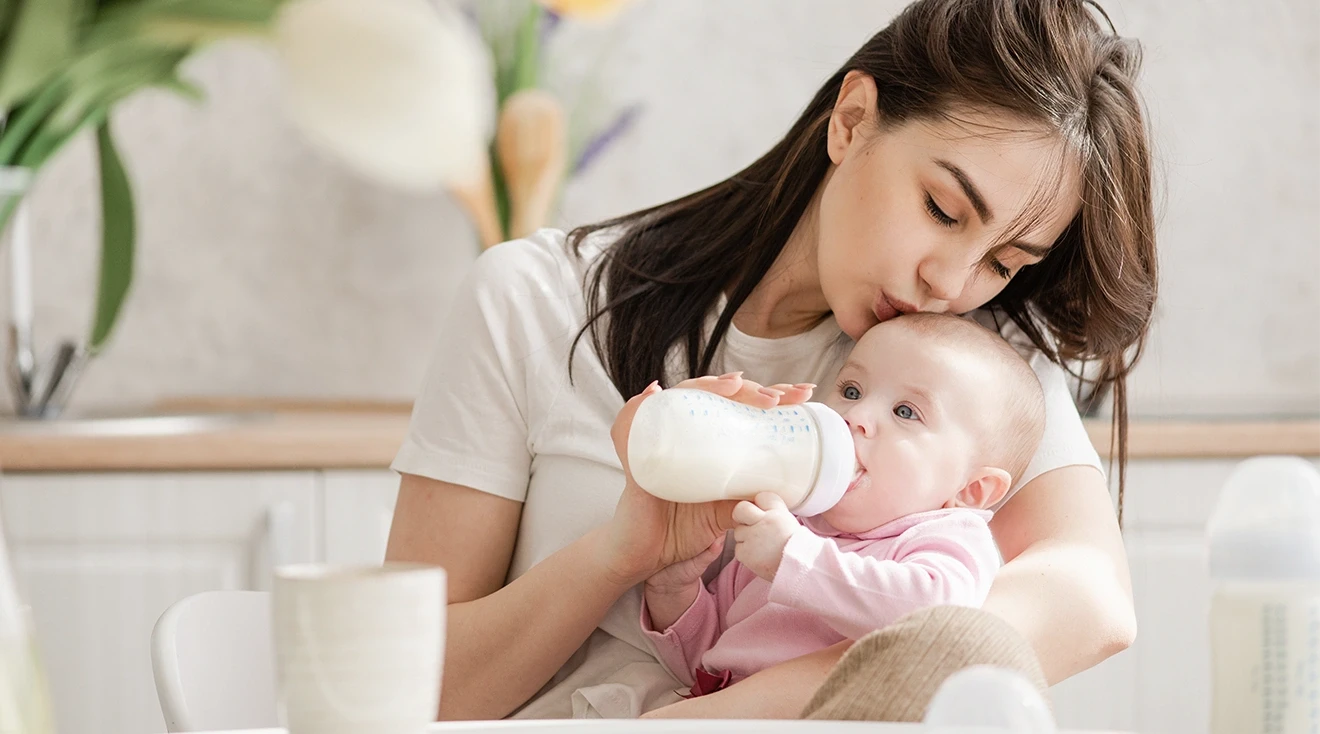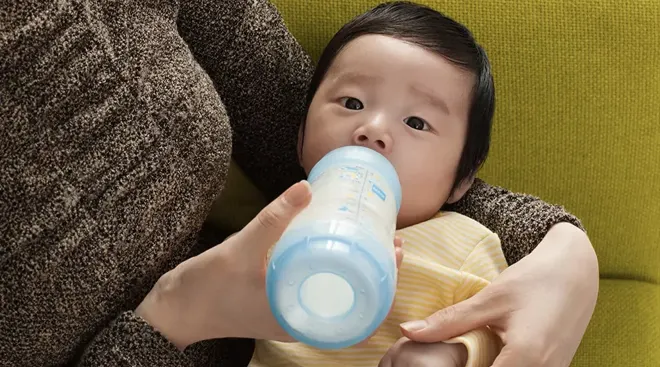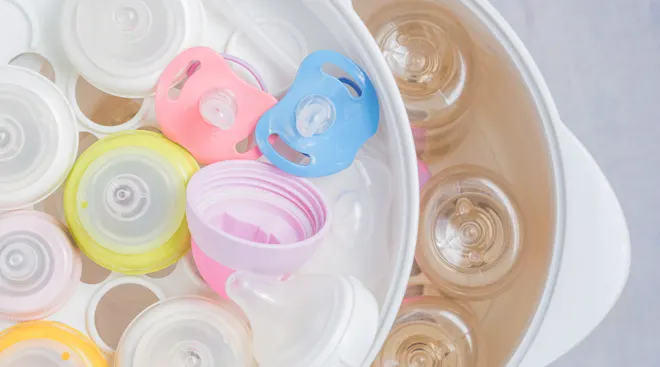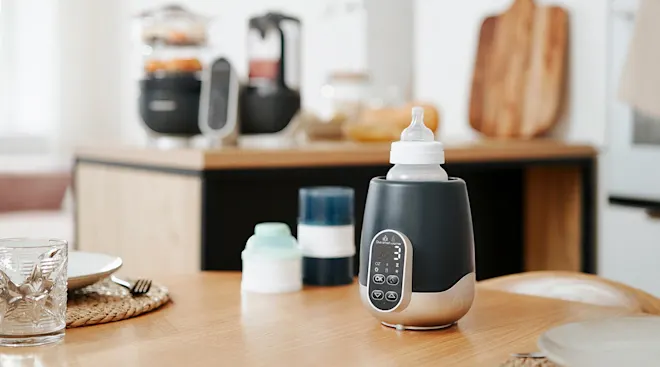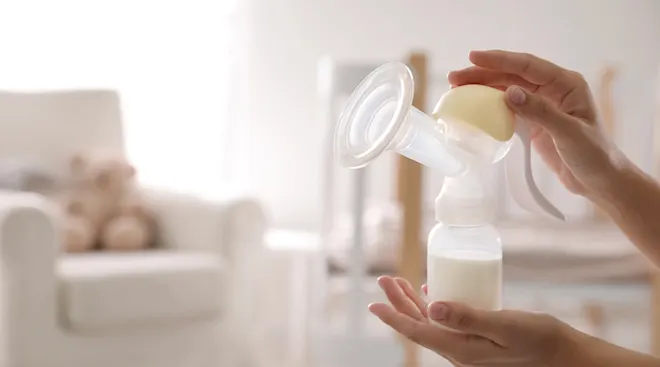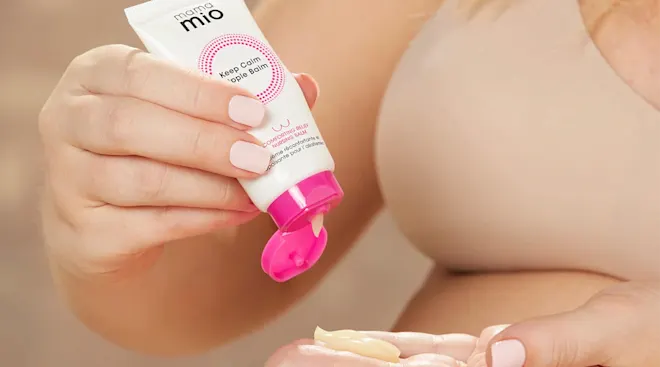The Best Baby Formula Options, According to the Bump Community
In a nutshell:
Based on extensive market research and advice from experts, we chose the Parent’s Choice Advantage Premium Powder Baby Formula as the overall best baby formula. It stood out because it offers a high-quality ingredient list that’s comparable to more expensive brands but sold at a reasonable price point.
Keeping baby happy, healthy and nourished is a top priority for parents. For various reasons, many decide to supplement breast milk with formula or rely solely on formula to meet their infant’s nutritional needs. Choosing to feed baby formula can come with a lot of mixed emotions for new parents. “I had a lot of anxiety about formula feeding,” shares Laura B., a mom of three from The Bump community. “Everything from worrying about preparing the formula to stressing how long a bottle is good for, to ensuring everything was sanitary. I wish I would have known that it’s not hard!”
A fact to help put your mind at ease: Baby formula is engineered to resemble the nutritional composition of breast milk with an array of proteins, carbohydrates, fats and vitamins. The US Food and Drug Administration (FDA) strictly regulates the 30 nutrients that must be included in infant formulas, along with minimum and maximum amounts, so you can rest assured that all baby formula sold in the US will meet baby’s nutritional needs.
While all formulas have to meet the same safety and nutritional requirements set by the FDA, what does vary are babies’ individual needs and personal preferences, and what works for one infant may not work for another. “Parents should feel reassured that there isn’t one ‘perfect’ formula—what matters most is finding what works best for their baby,” says Mona Amin, MD, a pediatrician based in Miami, Florida. To help you figure out what might be a good option for your child, we reached out to members of The Bump community to determine which formulas worked well for other families’ specific needs.
To simplify your search for the best baby formula for your family, we conducted extensive market research and considered feedback from parents in The Bump community to identify the most recommended formulas on the market, taking the following steps:
- We reached out to parents on The Bump staff who have used baby formula with their children to learn about their first-hand experiences.
- We researched what was being said about infant formula in The Bump forums to learn what parents liked and disliked about certain brands and products.
- We read through parenting forums and message boards and user reviews to understand how these baby formulas have worked for families nationwide.
- We interviewed three pediatricians, a pediatric nutritionist, a pediatric gastroenterologist and a lactation consultant. They told us what factors parents should consider when choosing a baby formula, what to look for when choosing a formula for a specific need or dietary restriction and other general tips.
- We consulted safety guidelines and nutritional recommendations from the FDA and the American Academy of Pediatrics (AAP) to learn about the nutritional makeup of infant formula in the US and how and when formula should be introduced into baby’s diet.
- We read relevant scientific studies to better understand the different types of nutrients in baby formula, and why and how these ingredients benefit infants.
- We looked at several factors—like primary carbohydrates, ingredient lists and price points—when choosing which baby formulas to include in our article. Based on recent findings from Consumer Reports, we only considered options on their “Top Choices” list, meaning that their research found no or low levels of harmful contaminants, such as arsenic, lead, PFAS and more.
Editorial integrity is at the heart of everything we publish. Read about how The Bump develops and reviews all articles, including product reviews.
Overall best baby formula
- Most affordable price per ounce on our list
- Contains lactose as the primary carbohydrate
- Great option for newborns, based on expert advice
- Subscription option available
- Some parents report a fishy smell
No formula is one size fits all—but this option from Parent’s Choice, Walmart’s in-house baby label, is a dependable (and affordable) choice for many families. Parents and nutritionists appreciate that it contains lactose as a primary ingredient, whereas other formulas on the market use corn syrup solids as the main carbohydrate. Research shows that carbohydrates make up about 40 percent of the calories that infants receive from formula or breast milk. Further studies are still forthcoming on the pros and cons of corn syrup in infant formulas, and it’s worth noting that these are not the same as high-fructose corn syrups. However, many parents and experts favor lactose-based options because they’re considered more nutritionally similar to breast milk, where lactose is also the primary carbohydrate. Moreover, lactose “supports brain development, aids in calcium absorption and contributes to a healthy gut microbiome, which is especially important in the early months of life,” explains Amin.
In addition to lactose as a primary ingredient, the Parent's Choice Advantage Premium formula contains various vitamins and minerals to support baby’s development throughout the first six months. It’s the only option in our roundup that includes dual human milk oligosaccharides (HMOs), 2’-fucosyllactose (2’-FL) and lacto-n-neotetraose (LNnT), which scientific studies identify as two of the main components commonly found in breast milk after lactose and lipids. Researchers state that these particular “HMOs may support immune function development” and can help provide protection against infectious diseases from an early age. Likewise, this formula has docosahexaenoic acid (DHA), also present in breast milk and which “may have positive effects on visual function and neural development over the short term,” according to the FDA.
With all these advantages, you might expect a high price tag. But another reason the Parent's Choice Advantage Premium Powder Baby Formula stood out in our research is that it’s the least expensive option on our list per ounce. “I highly recommend it. I've had no problems, and it seriously saves us so much money,” shares HillaryPhilbrick, a member of The Bump community forums. In short, this infant formula can be counted on to provide your little one with a well-rounded range of nutrients—all without breaking the bank.
Quantity: 36 oz. | Primary carbohydrate: Lactose
Our community says:
We use the Parent's Choice Premium. […] The formula mixes really good and it doesn't produce a lot of bubbles. It's easy on [my son's] stomach and he hardly spits up. – HillaryPhilbrick, The Bump forum member
We've used it for nearly 3 months now and [our son] is doing great on it and you can't beat the price. – AdamsWife08, The Bump forum member
We use Parents Choice formula and love it. We had no problem with the transition either. – wearenutts, The Bump forum member
Best organic baby formula
- USDA-certified organic and Clean Label Project-certified
- Contains lactose as the primary carbohydrate
- Great option for newborns, based on expert advice
- Subscription option available
- Some parents say the consistency is thin
Several parents in The Bump community told us that finding an organic baby formula was their priority, especially with their first children. “Organic was important to me initially,” shared Laura, a mom of three. Bobbie Organic Infant Formula is the only option in our roundup that’s USDA-certified organic and Clean Label Project-certified. These mean that it contains at least 95 percent certified organic content and has successfully passed thousands of tests for concerning chemicals including heavy metals, pesticide residues and plasticizers.
Like the Parent’s Choice Advantage, Bobbie Organic Infant Formula lists organic lactose as its primary ingredient. It’s also made with organic, grass-fed non-fat milk, which the brand sources from small family-run dairy farms. To more closely mimic the composition of breast milk, the formula’s organic protein blend has a whey-dominant ratio, which pediatrician Amin says can help support digestion. To top it all off, this organic baby formula also contains DHA, ARA and iron, all of which Amin considers important qualities in formula for newborns. As a result, you can rely on it to deliver an organic nutritional profile to baby during their first few months and until their first birthday.
Quantity: 14.1 oz. | Primary carbohydrate: Lactose
Our community says:
We used Bobbie, and I was very happy with it. I loved that it's modeled after formula in the UK. I also loved that it was a small female-owned company and the subscription option was a lifesaver. – Laura B., Mom of three
Organic was a priority to me as well as the cleanest ingredients. My son did well with Both ByHeart and Bobbie, but I used them sparingly and focused on getting the majority of his nutrition through organic foods. – Ashley G., Mom of one
Best European baby formula
- Made in Europe and approved by the FDA
- Contains whole milk, with lactose as the primary carbohydrate
- Creamy texture and taste, which some babies love
- No subscription option available
Some parents like the idea of using a European baby formula, since there’s a perception that European Food Safety Authority regulations are even stricter than those of the FDA. But there are some safety concerns if parents buy imported European formula through third-party vendors (technically illegal, if those manufacturers aren’t registered with the FDA); the FDA doesn’t inspect imported formula for safety, and there’s a risk the formula wasn’t transported or stored under safe temperatures, doesn’t clearly state in English the correct formula-to-water ratio (which differs from US formulas) or doesn’t meet US labeling requirements (for example, the US and Europe have different rules for what’s considered hypoallergenic). Kendamil, which is made in the UK, was the first European formula approved by the FDA for distribution in the US, so it’s an ideal choice for parents who want to try a European-style baby formula without worrying about safety.
Kendamil is also one of the only formulas in the US that uses whole milk, another signature of European-style formulas. Research shows that “fat is the second largest macronutrient [in breast milk] and plays the most important role in the nutrient supply in infants.” It consists of nearly 50 percent of the total energy content baby receives from formula or breast milk, and in most formulas, it typically comes from cow’s milk and/or oils. Many infant formulas that use lactose as the primary carbohydrate also contain skim or non-fat milk. In contrast, Kendamil Infant Formula Powder is the only option in our roundup with whole-fat milk on its ingredient list.
The decision to feed your child a formula that contains skim, non-fat or whole milk is largely down to personal preference. (Many parents and experts say that whole milk options taste creamier, which some infants may like more than others.) That being said, it’s worth noting that skim and non-fat milk options tend to use more vegetable oils than whole-milk formulas to supplement their fat content.
While Kendamil also contains three oils (coconut, sunflower and rapeseed), the whole milk in Kendamil’s formulation provides infants with naturally occurring MFGM (milk fat globule membrane), which studies show has an important role in baby’s digestion and metabolic programming. Other important nutrients this formula offers include DHA, ARA, a dual prebiotic blend and a unique HMO blend. Moreover, Kendamil sources its whole milk from grass-fed cows in Europe and proudly makes it to EU standards.
Quantity: 28.2 oz. | Primary carbohydrate: Lactose
Best formula for gassy babies
- Partially hydrolyzed protein for easier digestion
- Effectively reduces gas, according to The Bump community
- Patented prebiotic fiber blend to reduce stool discomfort
- No subscription option available
If your little one struggles with painful, excessive gas, Bridget Young, PhD, a breast milk researcher at the University of Rochester Medical Center and founder of BabyFormulaExpert.com suggests reaching out to your pediatrician to see if a baby formula with partially hydrolyzed proteins could work for them. If so, Enfamil NeuroPro Gentlease Infant Formula may be a soothing solution. It’s the only option in our roundup that has partially hydrolyzed protein, which some studies suggest may have a positive impact on managing colic, regurgitation and constipation in infants.
Several parents from The Bump community shared that this Enfamil formula has effectively reduced their child’s gas. “[My] little one just cried in pain for the first eight weeks,” says knottie11d0ecfce5a896b8, a parent from our forums. “[We] had to switch formula—Enfamil Neuro Pro Gentlease. Has [helped] a lot!” To further support baby’s digestion, this formula also contains a patented prebiotic fiber blend of polydextrose (PDA) and galactooligosaccharides (GOS). Research shows that these prebiotics work together to ease gastrointestinal discomfort by promoting softer stools.
As a replacement for lactose, Enfamil NeuroPro Gentlease Infant Formula uses corn syrup solids as its primary carbohydrate, which some may see as a drawback. However, “corn syrup or other glucose-based carbohydrates are sometimes used in formulas for babies who may have trouble digesting lactose or who have certain medical needs,” explains Amin, a pediatrician. “These alternatives are safe and regulated, and they can be helpful in specific situations.”
Quantity: 19.5 oz. | Primary carbohydrate: Corn syrup solids
Our community says:
We recently switched to Enfamil gentle tummy formula and that has helped so much with the immense gas pains our little guy was having! – kvothe2024, The Bump forum member
Best baby formula for severe indigestion
- Milk-free, amino acid-based protein effective for severe indigestion
- Helps reduce colic symptoms, according to parents
- Suitable for infants with milk allergies
- High price point per oz.
- May have a slightly bitter taste
Amin says, “for babies with specific medical conditions, a pediatrician may recommend a specialized formula, such as a hydrolyzed or amino acid-based option.” If you’ve tried a formula with partially hydrolyzed proteins and it isn’t sitting well with your child, your pediatrician may suggest trying an amino acid-based formula, like this option from EleCare. While partially or extensively hydrolyzed protein formulations contain broken-down milk proteins, amino acid-based formulas use amino acids as their protein source, so they don’t contain any milk. Research shows that amino acid-based infant formulas can effectively reduce atopic dermatitis and gastrointestinal complications in infants. This is especially true for babies who have a confirmed cow's milk protein allergy, which affects almost 3 percent of children under 3 years old.
Parents from The Bump community confirm that the EleCare Hypoallergenic Amino Acid-Based Powder Baby Formula has been an effective solution for their little ones who have suffered from colic and severe indigestion. “My son was colicky and had very bad reflux. We had to do formula, and we went through five different formulas before we found one that worked for him. We ended up going with EleCare as that was the one that was most broken down and his stomach could handle,” mom-of-one Rebecca T. shared with us.
Like the Enfamil option we included in our roundup, this formula also contains corn syrup solids as a substitute for lactose as the primary carbohydrate. However, as Amin mentioned, this ingredient is considered a safe, regulated alternative for babies who have trouble digesting lactose. One caveat to consider, though, is that amino acid-based formulas may not be as palatable as other formulas. Young says these options are often bitter, so it may take some time for your child to get used to the taste.
Quantity: 14.1 oz. | Primary carbohydrate: Corn syrup solids
Baby Formula Comparison Chart
| Overall best baby formula | Best organic baby formula | Best European baby formula | Best formula for gassy babies | Best baby formula for severe indigestion | ||
|---|---|---|---|---|---|---|
Overall Best 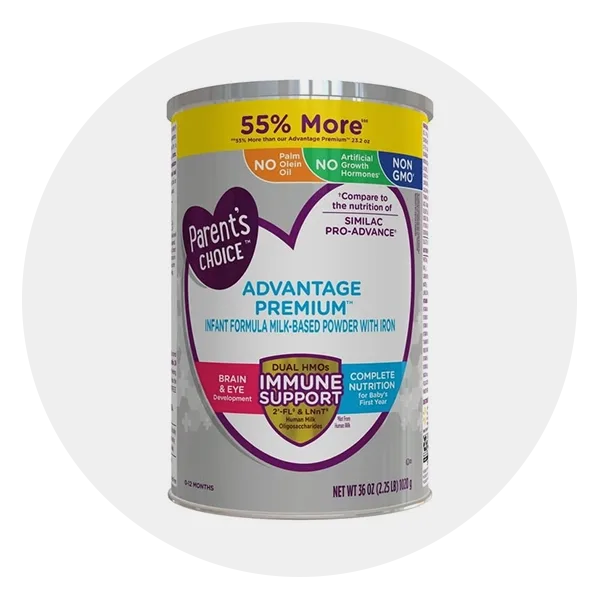 Parent's Choice Advantage Premium Powder Baby Formula | 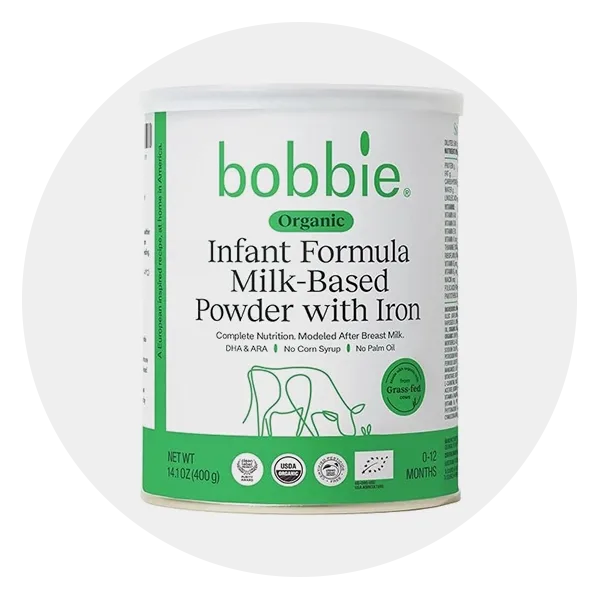 Bobbie Organic Infant Formula | 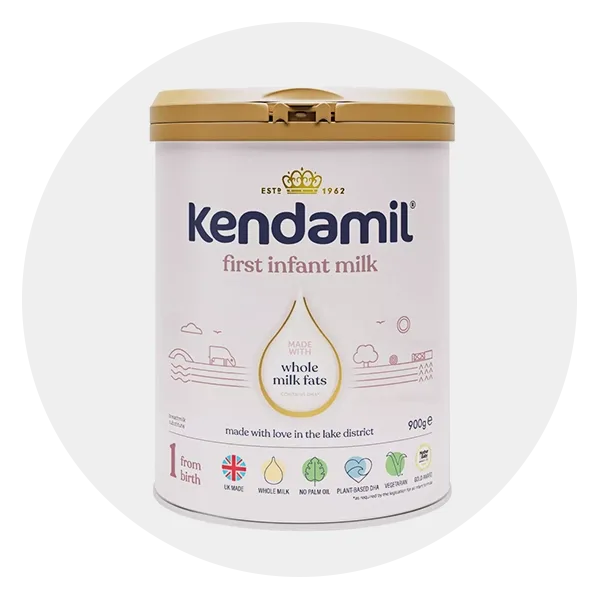 Kendamil Infant Formula Powder | 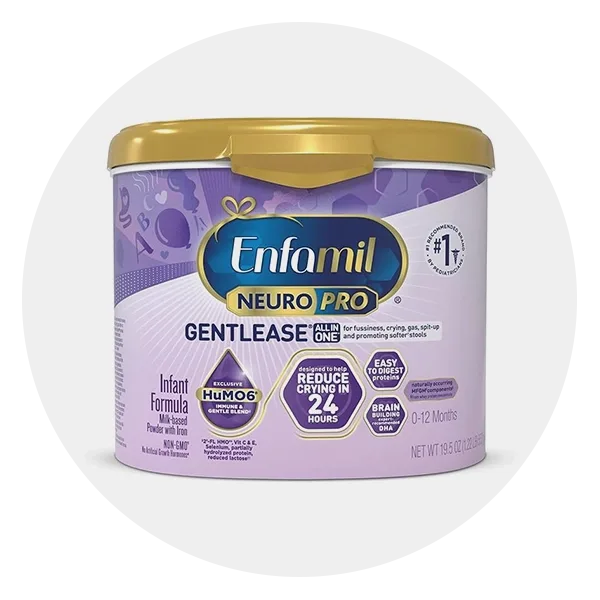 Enfamil NeuroPro Gentlease Infant Formula | 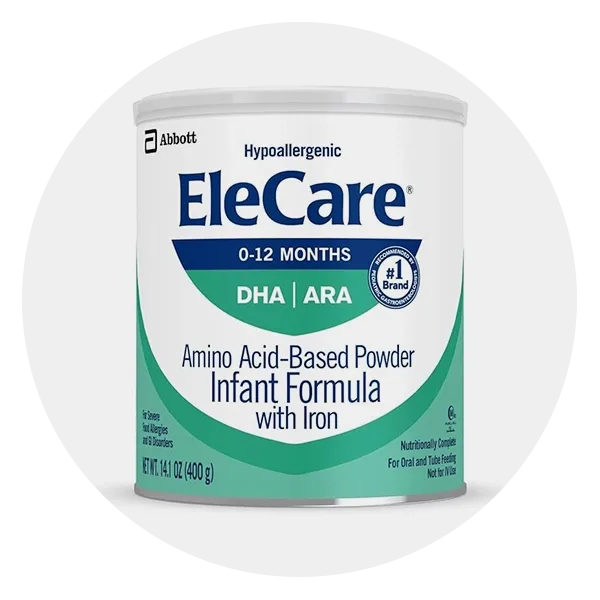 EleCare Hypoallergenic Amino Acid-Based Powder Baby Formula | ||
| Price per oz. | $ | $$ | $$ | $$ | $$$ | |
| Primary carbohydrate | Lactose | Lactose | Lactose | Corn syrup solids | Corn syrup solids | |
| DHA | ||||||
| ARA | ||||||
| Prebiotics | ||||||
| Iron | ||||||
| USDA-certified organic | ||||||
| Subscription option available | ||||||
| Buy NowRead Full Review | Buy NowRead Full Review | Buy NowRead Full Review | Buy NowRead Full Review | Buy NowRead Full Review |
Baby formula comes in different consistencies, and small variations in the recipe might make a difference in special circumstances, says Young, a breast milk researcher. But while there’s a wide range of baby formula brands to choose from, there are only three types:
- Powder baby formula. Typically sold in canisters or cartons, powdered baby formula needs to be mixed with a specific amount of water before it can be given to baby. It’s often the least expensive of the three options, and the powder typically lasts a long time. However, always check the expiration date to ensure that the formula is still safe to use. While powdered baby formula has a long shelf life, it can be messy and isn’t the most convenient option for travel. Some brands offer single-use travel packets, but they tend to be more expensive. In terms of preparation, powder formula must be mixed with safe drinking water, as outlined by the AAP. This type of formula is not recommended for premature newborns whose immune systems are still forming, since powdered food isn’t sterile.
- Liquid concentrate baby formula. This option also requires mixing and shaking with water, but because it’s liquid, you skip the scoop, which means there’s less mess. There are a couple of drawbacks though. First, it tends to be more expensive than powder formula. And, once opened, you need to refrigerate and use the entire container within 48 hours, which might not be realistic if you’re using formula as a supplement to breastfeeding.
- Ready-to-feed baby formula. This type of baby formula is premixed; simply open, pour and feed to baby. Ready-to-feed formulas come in single-serve bottles or larger volumes that can be decanted into a baby bottle. There’s little danger of contamination and no chance of any errors in preparation. You don’t need to refrigerate unopened bottles. However, once a ready-to-feed bottle is cracked open, it must be finished or discarded after 48 hours of refrigeration. This type also comes in single-use packaging, so it’s a less sustainable option.
For most healthy babies, the formula that’s in the baby-care package that your hospital sends you home with will probably do just fine, says Sandra Arévalo, RDN, a spokesperson for the Academy of Nutrition and Dietetics. But when it’s time to restock, you may want to try something different.
To determine the best formula for your child, start by talking with your pediatrician. Discuss any allergies or dietary issues you might have, along with any nutritional concerns or worries about allergies for baby. From there, they can help you choose the best formula for your little one. If you try a formula and baby doesn’t react well, contact your pediatrician to discuss what to do next.
Below, find expert advice on what exactly you should look for when choosing baby formulas for every age, need and dietary restriction.
Best baby formula for newborns
Steven Abrams, MD, chair of the American Academy of Pediatrics Committee on Nutrition, explains that breast milk ingredients are dynamic: They constantly change to fulfill a growing infant’s needs, from bolstering their developing immune system to building muscle strength. As a set formulation, any baby formula is going to have a tough time truly competing with what breast milk offers newborns.
Still, if your family is formula-feeding, you don’t need to worry that you’re not meeting the bar for your child. Standard formulas will work for healthy newborns, Arévalo says. Pediatrician Amin further explains: “Infant formula is designed to provide complete nutrition for babies from birth through 12 months.” But if you’re worried, she also notes that “some formulas are marketed specifically for newborns (0 to 3 months). These may have slight differences in composition, such as modified protein ratios or added whey for easier digestion. However, most standard infant formulas meet the needs of both newborns and older infants.”
According to Amin, there are several features parents should look for in formula for newborns. Our choice for overall best baby formula, Parent’s Choice Advantage Premium, meets all of these criteria, as do other options in our list:
- Lactose as the primary carbohydrate. Formulas with lactose as the primary carbohydrate “closely mimics breast milk and supports digestion,” Amin explains.
- Contains whey-predominant protein: “Breast milk naturally has more whey than casein, which can help with digestion,” Amin states.
- Includes DHA and ARA. Amin explains that these fatty acids support brain and eye development.
- Has iron. “This is essential for healthy growth and brain development,” says Amin.
The exception here is very premature babies (born at 28 to 32 weeks), who would receive specific feeding recommendations from the NICU that could potentially include donor breast milk. Once baby arrives home, your doctor will recommend the appropriate feeding regimen. For older preemies (born at 32 to 37 weeks) or underweight term babies, baby formula options may open up more.
Best organic baby formula
Organic baby formula is sourced from cows raised on an organic diet (no pesticides, no antibiotics), and uses naturally-derived vitamins instead of those made from petroleum. That said, just because it’s organic doesn’t mean it’s automatically free of other controversial ingredients, such as corn syrup, palm oil or hexane-sourced DHA and ARA. (Hexane, a byproduct of petroleum refining, doesn’t sit well with some parents, though the FDA has deemed its use as a processing agent safe.)
From a strictly scientific standpoint, it’s not certain that organic baby formula is better than conventional. However, what is certain is that it’s pricier. According to Arévalo, “there’s no difference nutrition-wise.” Still, if your wallet can handle it—and going organic gives you peace of mind—give it a try, Young says.
Whatever you decide, remember that the best organic baby formula is one that answers the needs of your child. If you can’t find an option that checks all the boxes (for example, baby needs hydrolyzed proteins for digestive issues), then Arévalo says it’s better to go with the formulation baby requires, whether organic or not.
Best baby formula for breastfed babies
Many brands market particular products as supplementary formulas for breastfed babies. However, Young says there’s no need to buy a special formula if you’re supplementing your breast milk with formula.
Most importantly, formula-feeding for breastfed babies is less about the product and more about the protocol. Each time you don’t feed baby from the breast, your milk ducts get the signal that there’s less demand, and produce less milk. To avoid a dip in your supply, pump when you can to make up for the missed breastfeeding session.
Best baby formula for gassy babies
“All babies have gas,” says Young, “Babies eventually learn how to eliminate it themselves.” So before searching for the best formula for gassy babies, make sure your child isn’t excessively gassy for other reasons. Feed baby upright, always with their head above their tummy. Choose a bottle nipple that flows slowly and burp baby frequently. If you’re using powder formula, let the bubbles settle before the feeding starts, or try using a liquid concentrate or ready-to-feed formulation. Angled and vented bottles may also help reduce gas in infants.
In rare cases, gassy babies may be sensitive to lactose, a sugar naturally found in cow’s milk (and therefore most baby formulas). Lactose is also in breast milk, but breast milk contains other compounds that help baby digest it, explains Young. In this case, the best baby formula for gas may be a partially hydrolyzed or an amino acid-based option with little to no lactose. As always, check with your pediatrician before switching to wither of these formulas.
Best baby formula for constipation
It’s not easy to poop lying down, so if baby looks like they’re putting in a lot of effort, just know that it’s completely normal. However, if they’re straining for more than 10 minutes—or if they’re pooping noticeably less than before—your little one might be constipated. Other clues include fussiness, hard stools and unusually frequent spit-up.
Before you switch formulas, try to help baby poop by laying them on their back and “bicycling” their legs or giving them a warm bath. Contrary to popular belief, iron-fortified baby formula doesn’t cause constipation (and is helpful to baby’s growth), according to the AAP.
Best baby formula for colic
A colicky baby is defined as an otherwise healthy infant under 3 months of age who cries for more than three hours a day, more than three days a week and for more than three weeks in a row for no apparent reason. Doctors aren’t sure exactly what causes colic, but it’s natural to wonder whether baby formula has something to do with it. (And yes, gastrointestinal issues could be a part of the problem.)
Before switching your formula, Arévalo says to “give it at least a week or two,” and see if any tips and tricks for relieving a gassy or constipated baby help. That said, if your child is also vomiting, coughing and wheezing, has trouble breathing, breaks out in a rash, gets diarrhea and/or has itchy, watery or swollen eyes, they might be sensitive to the protein in the formula or—in the case of the more severe symptoms—an all-out milk protein allergy, explains Melanie Greifer, MD, a pediatric gastroenterologist at NYU Langone Health in New York City. If you suspect digestive troubles are the cause for extreme fussiness, Young advises parents to talk to a pediatrician about trying partially hydrolyzed proteins.
If a partially hydrolyzed baby formula doesn’t work, you may need to try an option made with thoroughly hydrolyzed proteins. The proteins in these formulas are broken down into even smaller units so baby’s immune system won’t revolt against them. A switch to a fully hydrolyzed option shouldn’t be taken lightly though. These types of baby formula tend to taste bitter and have an unpleasant odor, says Young. To warrant this step, baby should be diagnosed as having a full-on milk protein allergy. Keep in mind that switching to a soy-based formula won’t necessarily help either. According to the AAP, “soy formulas are not recommended in infants with cow milk allergy because up to half the infants who have milk allergy are also sensitive to soy protein and therefore must be given specialized formula (such as amino-based or elemental) or breast milk.” As always, speak with your pediatrician to understand if and how this switch may affect baby.
All in all, be aware that special formulas that feature bonus ingredients, such as probiotics, are touted as offering particular benefits for baby, but experts say this is largely just marketing. “Take it with a hefty grain of salt,” says Kimberly Gronsman Lee, MD, associate professor of pediatrics at the Medical University of South Carolina in Charleston. “Any infant formula sold in the US should be FDA-regulated and acceptable in terms of nutrition.”
Formula shortages are an unfortunate possibility. If you run out of formula and can’t find it at your regular stores, call around to pharmacies and baby supply stores in your area. These places aren’t often top-of-mind for shoppers searching for formula, and they may still have some in stock. You can also ask your pediatrician if they have any samples to tide you over. If you typically receive and use WIC or SNAP benefits to purchase formula and don’t see your WIC products, contact your local food bank or women’s shelter. (Your state may also allow you to use WIC for a larger selection of products when certain formulas are out of stock.)
If you can’t find your typical brand and type of baby formula, consider switching to whatever’s available. While changing brands and types of formula can be okay for some babies, others might experience discomfort as they adjust to the new formula. If you’re concerned that baby won’t handle a new formula well, or if baby has special dietary needs and you’re not sure what to get, contact your pediatrician. The AAP warns against feeding baby cow’s milk or watered-down formula. The AAP also advises parents not to make homemade formula as a replacement, as it could be dangerous for baby’s health.
About the writer:
Emma O’Regan-Reidy is an editor for The Bump. She specializes in writing e-commerce content and has spent years researching the most popular baby formulas and feeding gear. Based on her extensive market knowledge, Emma strives to create supportive, informative articles to help new and seasoned parents find the best baby formulas for their little ones.
Please note: The Bump and the materials and information it contains are not intended to, and do not constitute, medical or other health advice or diagnosis and should not be used as such. You should always consult with a qualified physician or health professional about your specific circumstances.
Plus, more from The Bump:
Bridget Young, PhD, CLC, is a breast milk researcher at the University of Rochester Medical Center and has a PhD in perinatal and pediatric nutrition from Cornell University. She’s also a certified lactation consultant and the founder of BabyFormulaExpert.com.
Kimberly Gronsman Lee, MD, is board-certified in pediatrics and neonatal-perinatal medicine and is an associate professor of pediatrics at the Medical University of South Carolina in Charleston. Her clinical interests lie in breastfeeding and feeding difficulties. She earned her medical degree from Wayne State University School of Medicine and her master’s degree from Harvard School of Public Health.
Melanie Greifer, MD, is a pediatric gastroenterologist at NYU Langone Health in New York City and a clinical associate professor of pediatrics at NYU Grossman School of Medicine. She earned her medical degree from SUNY Brooklyn, and completed her fellowship in gastroenterology at Weill Medical College of Cornell University.
Mona Amin, MD, is a board-certified pediatrician based in Miami, Florida. She is also the host of the PedsDocTalk podcast. She received her degree from ATSU School of Osteopathic Medicine in Arizona, and completed her pediatric residency at the Bernard and Millie Duker Children’s Hospital in Albany, New York.
Sandra Arévalo, MPH, RDN, CDN, CDE, is a registered dietician-nutritionist and a spokesperson for the Academy of Nutrition and Dietetics. She also serves as director of nutrition services and community outreach at Community Pediatrics, a program of Montefiore and The Children’s Health Fund.
Steven Abrams, MD, is chair of the American Academy of Pediatrics Committee on Nutrition and professor of pediatrics at the University of Texas Dell Medical School in Austin. He earned his medical degree from Ohio State University and completed a fellowship in neonatal-perinatal medicine at Baylor College of Medicine. From 2012 to 2015, he served as a member of the Dietary Advisory Committee of the US Department of Agriculture.
Consumer Reports, We Tested 41 Baby Formulas for Lead and Arsenic, March 2025
FDA, Infant Formula, January 2025
FDA, Questions & Answers for Consumers Concerning Infant Formula
Healthy Children (AAP), Why Do Infants Need Baby Formula Instead of Cow's Milk?, April 2024
Healthy Children (AAP), Is Your Drinking Water Safe?, February 2023
Healthy Children (AAP), Choosing a Baby Formula, October 2023
Healthy Children (AAP), Is Homemade Baby Formula Safe?, May 2022
National Library of Medicine (NIH), Roles of Milk Fat Globule Membrane on Fat Digestion and Infant Nutrition, May 2022
National Library of Medicine (NIH), Components of human breast milk: from macronutrient to microbiome and microRNA, March 2020
National Library of Medicine (NIH), Human Milk Oligosaccharides: 2′-Fucosyllactose (2′-FL) and Lacto-N-Neotetraose (LNnT) in Infant Formula, August 2018
National Library of Medicine (NIH), Evaluation of an Amino Acid−Based Formula in Infants Not Responding to Extensively Hydrolyzed Protein Formula, October 2016
The New York Times, European Baby Formula That Is Illegally Sold in the United States Carries Risks, Pediatricians Warn, April 2020
Navigate forward to interact with the calendar and select a date. Press the question mark key to get the keyboard shortcuts for changing dates.

































